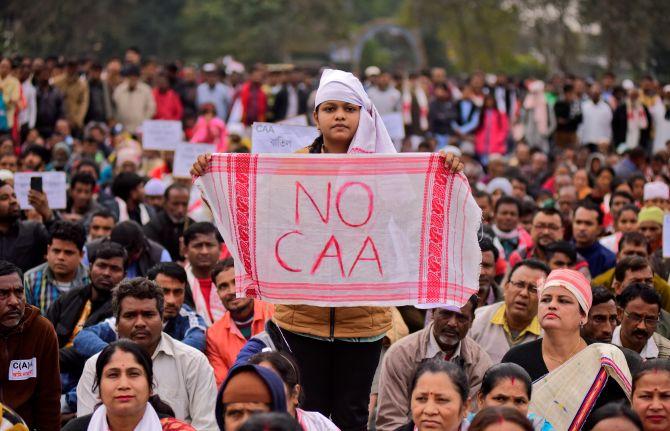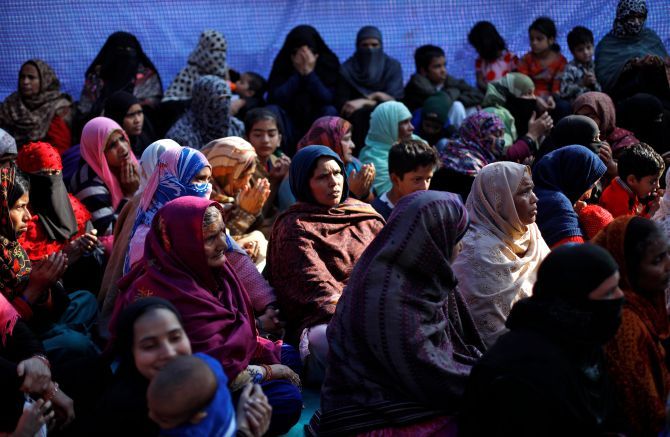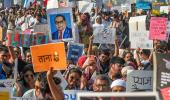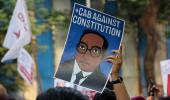'The CAA should be kept in abeyance without making it a prestige issue.'
'Laying down a clear policy on the future of illegal migrants will dispel anxieties and help in implementing the CAA, NPR and also the NCR,' suggests former Union home secretary Dr Madhav Godbole.

India is witnessing a raging controversy over the eligibility of illegal migrants for citizenship.
The three issues in discussion are the Citizenship (Amendment) Act, 2019 (CAA), up-dating of the national population register (NPC), and compilation of a national citizens register (NCR).
Though independent of each other, in a sense, they are inter-related.
Importantly, resolving the issue of the status of illegal migrants is the key to finding a solution to the conundrum facing India.
Widespread Opposition
Eight state governments have declared that they will not implement the CAA and will not permit the NPC and NCR to be executed.
It seems to make no difference to them that the CAA has been passed by Parliament by a comfortable majority.
The Kerala legislature has even passed a resolution opposing the CAA.
According to entry 17 of the Union List in the Seventh Schedule of the Constitution, 'citizenship, naturalisation and aliens' are the sole responsibility of the Union government.
Further, Article 256 of the Constitution casts a specific obligation on the states that 'the executive power of every State shall be so exercised as to ensure compliance with the laws made by Parliament'.
Non-observance of these provisions will mean a breakdown of the Constitution, but no one seems to be bothered.
In the name of secularism, political parties are projecting the present controversy as a do or die battle of ideologies.
Those who were responsible for creating the problem are in the forefront agitating on these burning issues.
Are illegal migrants to be governed by the provisions of the Constitution?
If so, what is the distinction between the citizens and them?
Article 15 of the Constitution pertaining to prohibition of discrimination on grounds of religion, race, caste, sex or place of birth is applicable only to the citizens, and not the mere residents of India.
The position taken by some leading intellectuals takes the breath away.
Arundhati Roy, a Booker Prize-winning novelist and activist, wants a civil disobedience movement to be launched by not paying taxes.
She has even suggested that when the survey for NPR and NRC will be underway, respondents should deliberately give wrong information!
The Nobel Laureate couple, Abhijit Banerjee and Esther Duflo, suggest that India should 'open its doors to all who sign up in our national mission of being democratic, open, tolerant and inclusive... We have 1.3 billion people -- a few more millions would disappear in a flash in that melting pot. And we would really be a loadstar for the world.' (The Indian Express, January 1, 2020, page 9)
The question is whether India should aim to be a lodestar or address its insurmountable problems of poverty, hunger, illiteracy, deprivation and unemployment, leave aside serious concerns of national security and integrity.
All I would say is that I am not on the same page with the Nobel Laureates.
Lost Perspective
In this highly polarised debate, the larger perspective is being lost sight of by all parties.
The primary responsibility for it must be placed at the door of the Union government which should have framed the question of citizenship in totality by addressing the gigantic problem of illegal migration over the last several decades.
Instead, by its classification of illegal migrants between Muslims and non-Muslims and giving preferential treatment to non-Muslim minorities from the three neighbouring Muslim countries of Afghanistan, Bangladesh and Pakistan for grant of citizenship, the Union government has communalised the issue.
This has come handy to political parties like the Congress, the Communists, the Janata Dal-United and the other so-called secular parties to take cudgels on behalf of Muslims and side-track the main question of illegal migration, in the same way they had successfully done for years together.
Enormity of the Problem

Illegal migration from East Pakistan and later Bangladesh was consciously over-looked and encouraged for vote-bank politics.
Anyone who tried to speak or write on the subject was branded as being pro-RSS or pro-BJP and effectively silenced.
Even Lieutenant General S K Sinha (retd), then the governor of Assam, who studied this subject in depth and forwarded his report to then President of India K R Narayanan in 1998 was criticised as being communal.
General Sinha had warned, 'A silent and invidious invasion of Assam has been taking place for several decades and successive Governments have failed to stem this demographic onslaught.'
Although Bangladeshi illegal migrants had gone into several states, they are more numerous in West Bengal than in Assam.
The general had suggested that 'the National Register of Citizens should be updated and computerised. A separate register of Stateless citizens should also be maintained.'
No action was taken on both these recommendations by successive governments.
Then Union home minister Inderjit Gupta had stated in Parliament on May 6, 1997 that there were 10 million (1 crore) illegal migrants in India.
Gupta belonged to the Communist Party of India and, with his ideological orientation, would not have accepted this figure without scrutiny.
After the Kargil War, the Union government had appointed four task forces to examine national security issues.
I was the chairman of the task force on international border management which, in its reports submitted in 2000, had estimated that illegal migrants totalled 15 million (1.5 crore).
By 2020, this figure is likely to be over 30 million (3 crore).
This perspective seems to have been totally lost sight of in the acrimonious debate on CAA.
Before presenting the Citizenship (Amendment) Bill in Parliament, the government should have examined the problem of illegal migration holistically and told the nation how it proposed to deal with it.
Merely giving citizenship to non-Muslim illegal migrants is not the answer.
Union Home Minister Amit Anilchandra Shah has been indulging in political grand-standing by calling the illegal migrants as termites and declaring that they would be deported.
This has understandably created widespread panic.
More importantly, it has created a sympathy wave for the infiltrators and illegal migrants!
Supreme Court decision
The subject of illegal migration came on the national agenda only after the Supreme Court decision in Sarbananda Sonowal vs Union Of India & Anr on July 12, 2005.
The top court had, in its ruling, referred to the internal displacement of locals as 'external aggression'.
The court had observed, 'Illegal immigrants from Bangladesh... enter surreptitiously and are able to mingle easily with the local population due to ethnic and linguistic similarities... Illegal immigrants from Bangladesh have also been using West Bengal as a corridor to migrate to other parts of the country...'
'As per 1991 census four districts (Dhubri, Goalpara, Barpeta and Hailakandi) have become Muslim majority districts. Two more districts (Nagaon and Karimganj) should have become so by 1998 and one district Morigaon is fast approaching this position.'
'The large-scale influx of illegal Bangladesh immigrants has led to large tracts of sensitive international borders being occupied by foreigners. This has serious implications for internal security.'
The apex court had relied on Entry 1 of List I of the Seventh Schedule pertaining to the defence of India and every part thereof, and Article 355 of the Constitution: 'Duty of the Union to protect States against external aggression and internal disturbance. It shall be the duty of the Union to protect every State against external aggression and internal disturbance and to ensure that the Government of every State is carried on in accordance with the provisions of this Constitution.'
The Supreme Court held that the provisions of the Illegal Migrant (Determination by Tribunal) (IMDT) Act, which was the instrument for declaring an illegal migrant a foreigner, clearly negated the above Constitutional mandate in Article 355, where a duty has been cast upon the Union of India to protect every State against external aggression and internal disturbance, and struck down the Act.
Action Taken -- A Cruel Joke
All that is being done in the name of evicting illegal migrants from Assam has become a joke, the Supreme Court had remarked on finding that precious little had been done by both the central and state governments to address the problem flagged as 'external aggression' by the 2005 decision.
With over 52,000 migrants declared as foreigners by foreigners tribunals in the last decade and 91,609 since 1985, the state claimed helplessness as almost 79 per cent of these persons were absconding by mingling with the local population.
Only 166 had been repatriated to their country of origin so far and almost 940 foreigners were being housed in the six detention centres in Assam.
There were 100 foreigner tribunals in the state but there has been no study to examine whether the tribunals were enough or more needed to be appointed. (DNA, 14 May 2019)
Available Options
Fears are being expressed that after the coming into force of the CAA, illegal Muslim migrants would be kept in detention centres till they are deported.
The Assam Accord signed in 1985 had provided in para 5.8 that 'Foreigners who came to Assam on or after March 25, 1971 shall continue to be detected, deleted and practical steps shall be taken to expel such foreigners'.
Clearly, this provision was made without adequate thought.
Expelling foreigners has been nearly impossible.
The General S K Sinha report had stated: 'International law does not provide for unilateral deportation in defiance of the views of the country to which the deportation is to take place. With the stand now taken by Bangladesh, it will not be possible for India to deport millions of illegal migrants to Bangladesh.'
'From 1993 to September 1998, the BSF (Border Security Force) tried to hand over 39,746 illegal migrants to the Bangladesh Rifles. The latter accepted only 9,253. The acceptance figures by Bangladesh declined from 5,799 in 1993 to only 55 in 1998 (up to 30 September).'
Considering their huge numbers, keeping them in detention centres is not a feasible options.
The recent Supreme Court order in Supreme Court Legal Services Committee v Union of India & Another, relating to detention centres in Assam has generated a lot of debate.
The order mentioned that those housed in detention centres in Assam who were awaiting deportation and had completed more than three years of detention should be released, subject to conditions such as the execution of bonds, providing a verifiable address of stay, recording biometric detail of the detenue, and regular reporting to foreigners tribunals.
The court also agreed that the Assam government should be given some more time to indicate the progress made on the diplomatic level, among others, with regard to deportation of declared foreigners and setting up of additional foreigners tribunals.
The Supreme Court had previously expressed its displeasure that 'foreign nationals' kept in detention centres in Assam were separated from their families, and asked the state government to look into the issue with some urgency to ensure families are not broken up. (Commonwealth Human Rights Initiative, May 22, 2019)
Deportation does not appear to be feasible looking to the experience so far.
It is important to note that neither the Sinha report nor the report of the task force on border management had considered deportation a feasible option.
It is important to note that Bangladesh has consistently refused to accept the illegal migrants and has denied that they are Bangladeshi citizens.
A distinction must be made between refugees, and illegal migrants and infiltrators.
The task force on border management had recommended that a refugee law should be enacted and the scheme of work permits should be introduced.
But no action has been taken thereon though two decades have elapsed since the submission of the report.
The only feasible option is to declare the illegal migrants as stateless persons.
The 1954 Convention Relating to the Status of Stateless Persons and the 1961 Convention on The Reduction of Statelessness are the key international conventions on statelessness.
An important provision of the 1961 convention establishes that children are to acquire the nationality of the country in which they are born, if they do not acquire any other nationality.
The Sinha report had recommended preparation of a register of stateless persons.
But this is only a temporary palliative as the international convention suggests that such persons should be assimilated in the given country within a period of ten years.
Further, it will be counter-productive to keep such a large section of humanity disgruntled and alienated.
This can have serious security implications.
At the most, such stateless persons could be legally deprived of voting rights and barred from voting for ten years (as laid down in the Assam Accord for those who were to be regularised), barred from holding sensitive posts having national security implications, and also barred from acquiring and holding immovable property.
To sum up

It is gratifying that Modi government has shown the political courage to address the problem of illegal migration, though only partially.
This needs to be taken to its logical conclusion.
The pros and cons and wide-ranging implications of the huge problem of illegal migrants not covered by the CAA and the options to deal with them need to be further examined carefully and debated calmly.
India has evaded to do it so far.
Laying down a clear policy on the future of such illegal migrants will dispel anxieties and help in implementing the CAA, NPR and also the NCR.
To create a proper atmosphere for the purpose, the CAA should be kept in abeyance without making it a prestige issue.
The Supreme Court may also be requested to defer the hearing of the cases till the issues are resolved politically.
It would be best if the government brings out a comprehensive white paper on the subject.
It will be impossible to get a complete picture of illegal migration in the country without a nation-wide NRC.
This question is important and must not be dodged any further.
Anxieties about the NRC can be reduced substantially by drawing lessons from the Assam NRC.
In a detailed report on the process of the NRC in Assam, Amnesty International India has criticised the judicial system for being 'complicit in perpetuating exclusion and abuse' and violating human rights.
The report, which studied in detail 16 cases of persons who were deprived of their citizenship by the foreigners tribunals, has stated that the process suffers from grave biases, prejudices and arbitrary decision-making.
Another fact-finding exercise, undertaken by members of Women against Sexual Violence and State Repression suggests that even minor discrepancies in names cost many a place on the list.
The report has also looked at the deep trauma, indebtedness, loss of lives and trust suffered by those who have fallen off the grid.
'The process has had a deeply damaging impact on the people of Assam... The fear of being detained in camps, deported to unknown lands, separated from friends and family, and attacked for being branded as foreigners have come to define everyday life for many in Assam,' the finding states. (The Wire, November 28, 2019).
Such inputs on genuine human problems must be taken into account in designing the NRC for the rest of the country.
Information which is available from other documents such as Aadhaar, NPR, and even the Census must be permitted to be used as much as possible to avoid troubling millions of persons in the country unnecessarily.
For this purpose, the concerned enactments may be amended, where necessary.
Additional questions proposed to be asked in the questionnaire of NPR 2020, which have raised unjustified controversy, should be retained as they are.
Looking at the NPR exercise with suspicion, which has happened as a fall-out of the CAA, is totally unjustified.
Before the NRC is launched, its purpose and modalities must be explained to the people fully.
This confidence-building effort must be undertaken with all seriousness and with an open mind to accept any reasonable suggestions which may come up.
The white paper on the CAA should also cover the NPR and NRC to build a national consensus.
In-built transparency will go a long way in making a success of these endeavours.
Pushing the problems under the carpet for years together has been responsible for the present country-wide turmoil.
It is time to resolve that this would not be permitted to happen again by postponing action on the NPR and NRC.
For, what is at stake is India's security, integrity, unity and communal harmony.
Dr Madhav Godbole is a former Union home secretary and secretary, justice. His two recent books are: The Babri Masjid-Ram Mandir Dilemma - An Acid Test for India's Constitution, and India's Governance.










